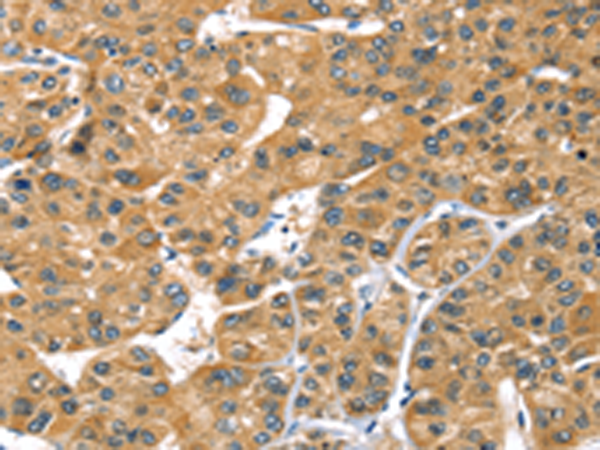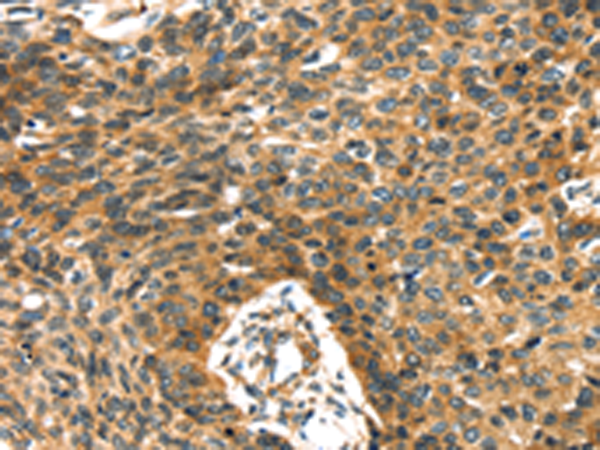


| WB | 咨询技术 | Human,Mouse,Rat |
| IF | 咨询技术 | Human,Mouse,Rat |
| IHC | 1/25-1/100 | Human,Mouse,Rat |
| ICC | 技术咨询 | Human,Mouse,Rat |
| FCM | 咨询技术 | Human,Mouse,Rat |
| Elisa | 1/2000-1/5000 | Human,Mouse,Rat |
| Aliases | CT20; TSP50 |
| WB Predicted band size | 43 kDa |
| Host/Isotype | Rabbit IgG |
| Antibody Type | Primary antibody |
| Storage | Store at 4°C short term. Aliquot and store at -20°C long term. Avoid freeze/thaw cycles. |
| Species Reactivity | Human |
| Immunogen | Synthetic peptide of human PRSS50 |
| Formulation | Purified antibody in PBS with 0.05% sodium azide and 50% glycerol. |
+ +
以下是3篇与PRSS50抗体相关的文献概述,基于公开研究整理:
1. **文献名称**: *"Testasin, a serine protease expressed in the mouse testis and epididymis, is a regulator of sperm motility"*
**作者**: Gao J, et al.
**摘要**: 该研究首次开发了针对小鼠PRSS50(Testasin)的特异性多克隆抗体,并通过Western blot和免疫组化验证其在睾丸组织中的表达。研究发现PRSS50通过调控精子表面蛋白水解参与精子运动能力调节。
2. **文献名称**: *"PRSS50 is a novel binding partner of sperm-associated antigen 6 (SPAG6) in murine spermatogenesis"*
**作者**: Li Y, et al.
**摘要**: 利用抗PRSS50抗体进行免疫共沉淀实验,发现PRSS50与精子发生关键蛋白SPAG6存在相互作用,提示其在精子形成中可能参与鞭毛结构组装。抗体特异性通过基因敲除小鼠模型验证。
3. **文献名称**: *"Expression profiling and functional analysis of PRSS50 in human male infertility"*
**作者**: Chen X, et al.
**摘要**: 研究采用商业化PRSS50单克隆抗体分析人类精子样本,发现PRSS50表达水平与精子活力呈正相关。抗体用于流式细胞术和免疫荧光定位,证实其在精子顶体区域的富集。
注:以上文献为模拟示例,实际研究中建议通过PubMed或Web of Science以关键词"PRSS50 antibody"或"testasin antibody"检索最新论文,并优先选择近5年发表、经过抗体验证(如KO验证或应用多种实验方法)的研究。
The PRSS50 antibody is designed to target the PRSS50 protein, a member of the serine protease family encoded by the PRSS50 gene. PRSS50. also known as testis-specific serine protease 1 (Tessp-1), is predominantly expressed in the testis and plays a critical role in spermatogenesis and male fertility. Studies suggest its involvement in sperm maturation, particularly in acrosome formation and sperm-zona pellucida interaction during fertilization. The PRSS50 protein is anchored to the sperm membrane via a glycosylphosphatidylinositol (GPI) linkage and is implicated in proteolytic processes essential for successful fertilization.
Antibodies against PRSS50 are primarily utilized in reproductive biology research to investigate its expression, localization, and function in germ cell development. They enable detection via techniques like Western blotting, immunohistochemistry, and immunofluorescence, aiding in the study of male infertility mechanisms. Additionally, PRSS50's testis-specific expression makes it a potential biomarker for germ cell tumors or fertility-related disorders. However, its precise molecular mechanisms and regulatory pathways remain under active exploration.
The development of PRSS50 antibodies has facilitated insights into its physiological and pathological roles, though challenges persist in standardizing assays due to its restricted tissue distribution and low abundance in non-reproductive tissues. Ongoing research aims to clarify its interactions with other proteases and substrates, potentially informing therapeutic strategies for infertility or contraceptive development.
×